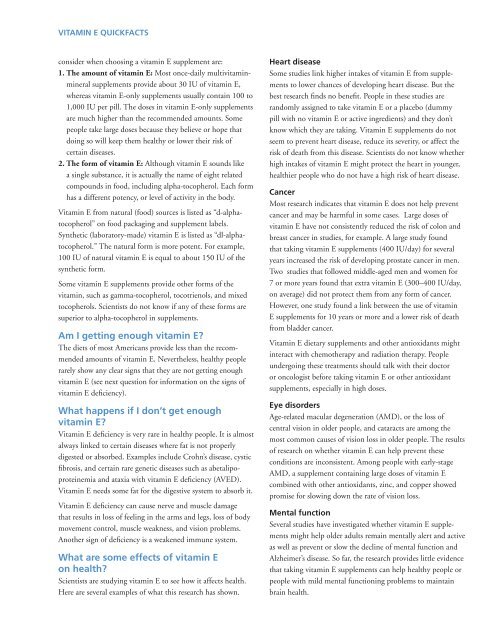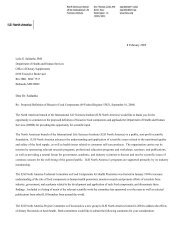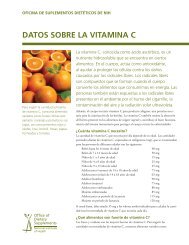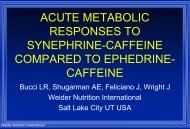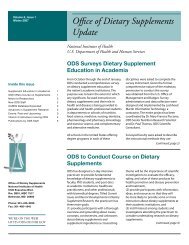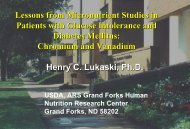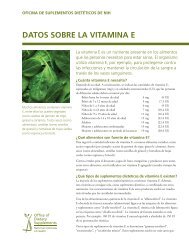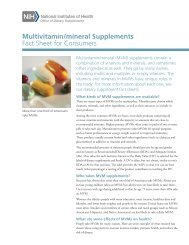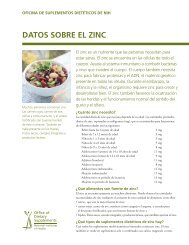Vitamin E - Office of Dietary Supplements
Vitamin E - Office of Dietary Supplements
Vitamin E - Office of Dietary Supplements
Create successful ePaper yourself
Turn your PDF publications into a flip-book with our unique Google optimized e-Paper software.
VITAMIN E QUICKFACTS<br />
consider when choosing a vitamin E supplement are:<br />
1. The amount <strong>of</strong> vitamin E: Most once-daily multivitaminmineral<br />
supplements provide about 30 IU <strong>of</strong> vitamin E,<br />
whereas vitamin E-only supplements usually contain 100 to<br />
1,000 IU per pill. The doses in vitamin E-only supplements<br />
are much higher than the recommended amounts. Some<br />
people take large doses because they believe or hope that<br />
doing so will keep them healthy or lower their risk <strong>of</strong><br />
certain diseases.<br />
2. The form <strong>of</strong> vitamin E: Although vitamin E sounds like<br />
a single substance, it is actually the name <strong>of</strong> eight related<br />
compounds in food, including alpha-tocopherol. Each form<br />
has a different potency, or level <strong>of</strong> activity in the body.<br />
<strong>Vitamin</strong> E from natural (food) sources is listed as “d-alphatocopherol”<br />
on food packaging and supplement labels.<br />
Synthetic (laboratory-made) vitamin E is listed as “dl-alphatocopherol.”<br />
The natural form is more potent. For example,<br />
100 IU <strong>of</strong> natural vitamin E is equal to about 150 IU <strong>of</strong> the<br />
synthetic form.<br />
Some vitamin E supplements provide other forms <strong>of</strong> the<br />
vitamin, such as gamma-tocopherol, tocotrienols, and mixed<br />
tocopherols. Scientists do not know if any <strong>of</strong> these forms are<br />
superior to alpha-tocopherol in supplements.<br />
Am I getting enough vitamin E<br />
The diets <strong>of</strong> most Americans provide less than the recommended<br />
amounts <strong>of</strong> vitamin E. Nevertheless, healthy people<br />
rarely show any clear signs that they are not getting enough<br />
vitamin E (see next question for information on the signs <strong>of</strong><br />
vitamin E deficiency).<br />
What happens if I don’t get enough<br />
vitamin E<br />
<strong>Vitamin</strong> E deficiency is very rare in healthy people. It is almost<br />
always linked to certain diseases where fat is not properly<br />
digested or absorbed. Examples include Crohn’s disease, cystic<br />
fibrosis, and certain rare genetic diseases such as abetalipoproteinemia<br />
and ataxia with vitamin E deficiency (AVED).<br />
<strong>Vitamin</strong> E needs some fat for the digestive system to absorb it.<br />
<strong>Vitamin</strong> E deficiency can cause nerve and muscle damage<br />
that results in loss <strong>of</strong> feeling in the arms and legs, loss <strong>of</strong> body<br />
movement control, muscle weakness, and vision problems.<br />
Another sign <strong>of</strong> deficiency is a weakened immune system.<br />
What are some effects <strong>of</strong> vitamin E<br />
on health<br />
Scientists are studying vitamin E to see how it affects health.<br />
Here are several examples <strong>of</strong> what this research has shown.<br />
Heart disease<br />
Some studies link higher intakes <strong>of</strong> vitamin E from supplements<br />
to lower chances <strong>of</strong> developing heart disease. But the<br />
best research finds no benefit. People in these studies are<br />
randomly assigned to take vitamin E or a placebo (dummy<br />
pill with no vitamin E or active ingredients) and they don’t<br />
know which they are taking. <strong>Vitamin</strong> E supplements do not<br />
seem to prevent heart disease, reduce its severity, or affect the<br />
risk <strong>of</strong> death from this disease. Scientists do not know whether<br />
high intakes <strong>of</strong> vitamin E might protect the heart in younger,<br />
healthier people who do not have a high risk <strong>of</strong> heart disease.<br />
Cancer<br />
Most research indicates that vitamin E does not help prevent<br />
cancer and may be harmful in some cases. Large doses <strong>of</strong><br />
vitamin E have not consistently reduced the risk <strong>of</strong> colon and<br />
breast cancer in studies, for example. A large study found<br />
that taking vitamin E supplements (400 IU/day) for several<br />
years increased the risk <strong>of</strong> developing prostate cancer in men.<br />
Two studies that followed middle-aged men and women for<br />
7 or more years found that extra vitamin E (300–400 IU/day,<br />
on average) did not protect them from any form <strong>of</strong> cancer.<br />
However, one study found a link between the use <strong>of</strong> vitamin<br />
E supplements for 10 years or more and a lower risk <strong>of</strong> death<br />
from bladder cancer.<br />
<strong>Vitamin</strong> E dietary supplements and other antioxidants might<br />
interact with chemotherapy and radiation therapy. People<br />
undergoing these treatments should talk with their doctor<br />
or oncologist before taking vitamin E or other antioxidant<br />
supplements, especially in high doses.<br />
Eye disorders<br />
Age-related macular degeneration (AMD), or the loss <strong>of</strong><br />
central vision in older people, and cataracts are among the<br />
most common causes <strong>of</strong> vision loss in older people. The results<br />
<strong>of</strong> research on whether vitamin E can help prevent these<br />
conditions are inconsistent. Among people with early-stage<br />
AMD, a supplement containing large doses <strong>of</strong> vitamin E<br />
combined with other antioxidants, zinc, and copper showed<br />
promise for slowing down the rate <strong>of</strong> vision loss.<br />
Mental function<br />
Several studies have investigated whether vitamin E supplements<br />
might help older adults remain mentally alert and active<br />
as well as prevent or slow the decline <strong>of</strong> mental function and<br />
Alzheimer’s disease. So far, the research provides little evidence<br />
that taking vitamin E supplements can help healthy people or<br />
people with mild mental functioning problems to maintain<br />
brain health.


